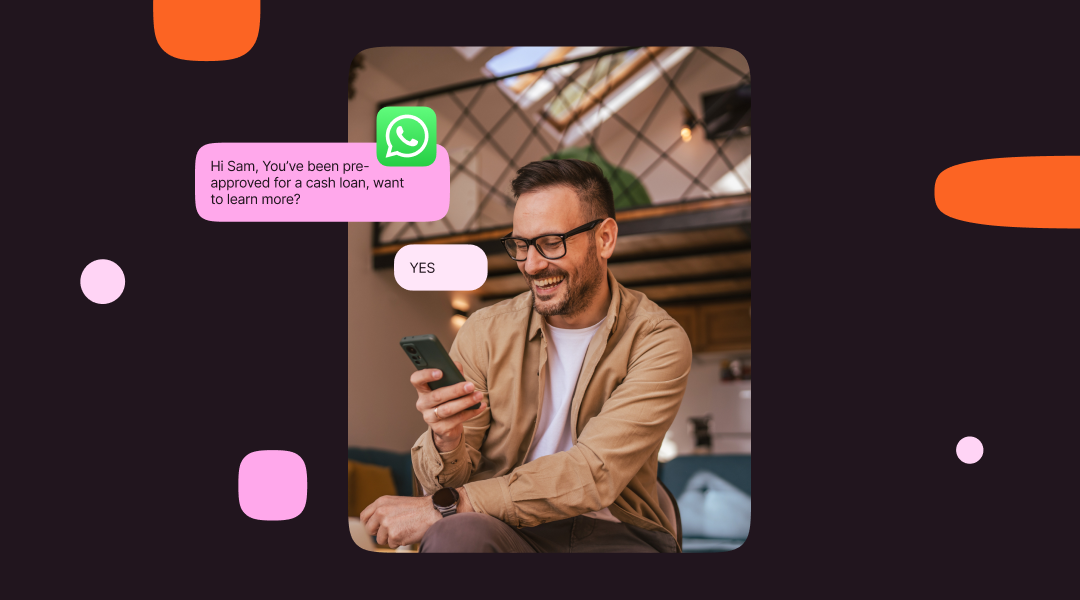WhatsApp vs WhatsApp Business: Full comparison of features, API, and use cases
Same green icon, completely different purpose. If you are choosing between WhatsApp Business vs WhatsApp, or wondering how the WhatsApp Business App compares to the WhatsApp Business API, this guide helps you find the version that actually fits your business.

WhatsApp is where the world talks. With more than 3 billion users and over 1 billion people already on WhatsApp Business, it has become a global space where customers ask questions, browse products and services, and complete purchases while chatting with friends and family.

Businesses that join this flow see faster customer engagement, stronger customer communication, and a better overall customer experience.
If you have ever searched for:
- WhatsApp Business vs WhatsApp
- WhatsApp Business vs personal
- WhatsApp Messenger vs WhatsApp Business
- WhatsApp Business vs normal WhatsApp
- WhatsApp vs WhatsApp Business differences
This guide finally explains it all in a simple way.
We also explore WhatsApp Business vs WhatsApp Business API, how the WhatsApp API vs WhatsApp Business App works, and how to start using the Infobip WhatsApp Business Platform with full API integration for marketing, customer support, and automated messaging.
This is your complete comparison across all three versions.
What is WhatsApp vs WhatsApp Business
WhatsApp Messenger is personal WhatsApp. It is the standard app people use to stay close to friends and family. Messaging is simple, fast, and familiar, making it one of the most trusted messaging platforms in the world.
WhatsApp Business App is the next step for small businesses that want additional features to organize customer communication. You still use the same interface as normal WhatsApp, but you also gain business profiles, product catalogs, quick reply messages, and simple ways to automate messaging for customer service.
The WhatsApp Business Platform API is built for companies that want to scale. It connects WhatsApp to your CRM, ecommerce platform, marketing automation tools, and customer support systems. It allows you to automate messaging, personalize communication, and support high volumes through Infobip.
If you start with personal WhatsApp or the Business App, you can migrate to the API as you grow.
Who should use each version
Most people use WhatsApp Messenger for personal chats and everyday communication.
Small businesses, freelancers, creators, and solo business owners often choose the WhatsApp Business App. It keeps conversations personal while adding useful tools like product catalogs, quick replies, and simple customer engagement features.
Medium and large businesses get the most value from the WhatsApp Business Platform. It supports chatbots, multi-agent teams, large customer bases, and automated business communication.
If your needs grow from manual messaging to structured customer support, onboarding, and marketing, the API becomes the natural next step.
Feature comparison in practice
When comparing WhatsApp Business vs WhatsApp Messenger, the difference is in the features.
| Feature | WhatsApp Messenger | WhatsApp Business App | WhatsApp Business Platform API |
|---|---|---|---|
| Business profile | No | Yes | Yes, with verified sender options |
| Product catalog | No | Yes | Yes, with advanced catalog and ecommerce integration |
| Quick replies and automated messages | No | Yes, basic automation | Yes, advanced automation through chatbots and flows |
| Labels and customer segmentation | No | Yes | Yes, with CRM and CDP integration |
| Multi-user support | Limited to linked devices | No real support for teams | Full multi-agent support through Infobip’s agent interface |
| API integrations | No | Limited | Full API integration with CRM, ecommerce, support platforms, and marketing tools |
| Analytics and insights | No | Basic message insights | Advanced analytics, reporting, and conversation tracking |
| Verification (¸blue tick) | No | Possible for eligible businesses | Yes, available for verified brands |
| Template messaging and automation | No | Limited, some templates | Full template messaging, proactive notifications, and automated journeys |
Personal WhatsApp focuses on chats, calls, and media sharing.
The WhatsApp Business App adds a business profile with your logo, address, hours, description, and product catalogs. You can label chats, set quick reply messages, create automated greetings, and manage basic customer support. Active markets also support payments for easier purchases.
The WhatsApp Business Platform API expands everything. You can automate messaging with chatbots, run customer support with real agents, integrate your CRM and CDP, personalize campaigns, and get real analytics. You also gain access to advanced entry points such as wa.me links, QR codes, and Click to WhatsApp ads.
Infobip supports automation with our chatbot building platform, our cloud contact center solution, full API integration, and omnichannel orchestration with SMS, RCS, Instagram, Viber, and more.
Technical and operational differences that impact scale
WhatsApp requires opt-in before you send business-initiated messages. Meta checks compliance closely, especially for marketing messages.
The WhatsApp Business App is tied to one phone. This limits companies with multiple agents. The API solves this with routing, automation, multiple agent logins, and integration with your existing systems.
To use the API, you apply through Infobip, verify your business, and connect your backend. Once you integrate WhatsApp into your stack, your team can manage customer service, customer support, and marketing journeys in one place.
Some features depend on your region such as payments, product catalogs, and calling. Always check availability before launch.
Pricing per-message and conversation model explained
WhatsApp uses a templated message pricing model with categories such as marketing, utility, authentication, and service.
Businesses can send non-templated message replies replies within the 24-hour window when a customer initiates the chat.
Always check Infobip’s live pricing to confirm current rates.
New and upcoming features in 2024 and 2025
Meta continues to expand WhatsApp Business with new customer experience features. Recent updates include the Business Calling API, better Click-to-WhatsApp ads with advanced analytics, richer catalogs, and improved quality rules.
The direction for 2025 focuses on conversational commerce, easier payments, stronger analytics, and new options for automated customer service.
Migration, conversion, and backup
Switching from personal WhatsApp to the Business App is simple. Your number and chats stay the same, and you gain access to business tools instantly.
Moving from the Business App to the API requires some planning. You choose whether to keep your existing number, prepare your templates, ensure opt-in, and connect your CRM or e-commerce system.
Backups and metadata may not fully migrate, so audit what needs to be recreated.
No need to worry about the switch. Infobip helps you migrate with a clear plan, expert support, and a smooth transition from start to finish.
How to choose the right solution
If you have a small customer base and simple needs, the Business App fits.
If your customer service requires multiple agents, automated messaging, or advanced reporting, the WhatsApp Business Platform API is the right choice.
Teams using Click-to-WhatsApp ads, customer engagement campaigns, or large-scale customer support should choose the API from the start.
Implementation and integration with Infobip
Infobip makes setup simple. You verify your number, apply for API access, configure your integrations, and start using templates for notifications, marketing, and customer support.
You can automate messaging, connect your CRM, and use conversational flows directly in our platform. A sandbox environment is available for testing before you go live.
Common use cases
When comparing WhatsApp vs WhatsApp Business differences, the value becomes clear in practice. Businesses use WhatsApp to deliver customer service, automate customer support, run promotional campaigns, manage orders, and guide customers through purchases.
Customers can browse catalogs, receive updates, or get help through chatbots or real agents. Payments, where supported, make the full customer journey possible inside WhatsApp.
With Infobip, you can create full journeys that increase customer engagement, improve customer communication, and support customers from discovery to retention.
Limits and considerations before you launch
Review opt-in rules, message templates, regional feature availability, number hosting options, and data residency requirements.
WhatsApp may not be ideal for regulated industries requiring guaranteed message delivery. In these cases, use WhatsApp with SMS or Voice as an omnichannel fallback.
Why Infobip
Infobip supports global WhatsApp deployments with direct Meta partnership, more than 40 data centers, 24/7 support, and a full omnichannel suite.
You can scale business communications, automate messaging, and integrate WhatsApp with your customer experience stack.
Telegram vs WhatsApp for business
Companies often compare Telegram vs WhatsApp for business. Telegram supports community-style engagement and flexible bots. WhatsApp provides verified business profiles, trusted customer communication, payments, and stronger privacy controls.
According to our latest Infobip research on the most popular messaging apps by country, WhatsApp is the number one channel in markets like Brazil with an 85 percent penetration rate, while some other regions may lean heavily toward Telegram, RCS, or even Apple Messages, so choosing the right app often depends on where your audience actually lives.
The best strategy in regions with mixed audiences is to use both. Telegram for reach and broadcast style engagement, and WhatsApp for personal conversations, customer support, secure flows, and higher conversion.
Infobip supports omnichannel journeys across Telegram, WhatsApp, SMS, RCS, and more.
FAQs
WhatsApp eCommerce is conversational commerce inside WhatsApp. Customers can browse products, ask questions, and complete purchases without leaving the chat. They can view product catalogs, open product listings, tap payment links, and receive instant order confirmations. It feels like shopping inside a familiar conversation with your brand.
Start by downloading the WhatsApp Business App and registering it with your business number. Create your profile with your business name, logo, address, hours, and a short description. Then add a product catalog with photos, descriptions, and prices. You can also link your website or Facebook Page for more details.
The WhatsApp Business App fits small and local businesses that manage chats manually. It is simple, personal, and works well for one on one communication.
The WhatsApp Business Platform or API is built for medium and large companies that need automation, CRM integration, chatbots, reporting, and multi agent support. It connects WhatsApp to your systems and scales as your customer base grows.
Chatbots give your store 24/7 support with fast replies, personalized recommendations, and secure communication. They answer common questions, guide shoppers, reduce cart abandonment, and boost conversion rates. They help customers find the right product and complete their purchase with less friction.
No. You need a clear opt-in before sending marketing messages. Meta requires businesses to follow strict consent and content rules. Sending messages to users who have not opted in can lead to restrictions on your account.
WhatsApp supports both promotional and transactional messages, each with specific guidelines. Transactional messages include order updates, OTPs, receipts, and confirmations. Promotional messages must follow Meta’s category rules and can only be sent using approved templates.
You can send automated reminders, personalized discounts, or time-sensitive nudges to encourage customers to complete their purchase. These messages can include product previews or payment links if helpful. All abandoned cart messages require prior consent and must follow WhatsApp marketing policies.
Yes. WhatsApp uses end-to-end encryption, two-factor authentication, and Meta’s privacy standards. Payments happen through approved third-party providers, which adds another layer of security for shoppers and businesses.
Yes. You can run both apps on a dual SIM device or by using two separate numbers. Both apps can work at the same time, but you cannot use the same phone number in both apps.
Meta continues to roll out new features. The latest updates include the WhatsApp Business Calling API, marketing optimizations via Marketing Messages Lite API, improved catalog experiences, and stronger ad integrations. New features arrive often, so check back regularly for updates.
It is time to upgrade when your message volume grows, you add multiple agents, or you need automation, chatbots, or CRM integration. The Business App works for small operations. The Business Platform or API is built for scale and offers far more flexibility.



























